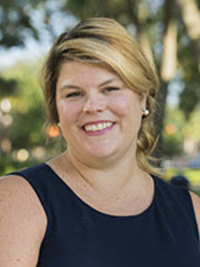We congratulate our winners of the 2022 Willa Dean Lowery Fund to Support Research in the Natural Sciences:

Roslyn Crowder, Associate Professor of Biology
Examining Hypoxia-Induced Caspase-8 Post-Translational Modifications in Hypoxic Cancer Cells
Caspase-8 is a mediator of regulated cell death, apoptosis. Caspase-8 mediated cell death is used clinically to target and eliminate pathogenic cells in diseases including cancer, lupus and rheumatoid arthritis. Loss of caspase-8 activity has been identified as a cell death resistance mechanism, highlighting the requirement of complete caspase-8 activation for cell death progression. Hypoxia is a term that refers to conditions with low oxygen levels. Hypoxic regions in solid, malignant tumors have been found to be resistant to chemotherapy and radiation therapy, presenting therapeutic challenges. Chemotherapy and radiation therapy utilize initiation of cell death pathways involving caspase-8 activation to kill cancer cells.
Caspase-8 protein receives several post-translational modifications (PTMs) that effect protein function including phosphorylation (adds phosphates), ubiquitination (adds ubiquitin) and sumoylation (adds SUMO). Cullin3 ligase and A20 deubiquitinase are associated with adding and removing ubiquitin to and from caspase-8, respectively. PIAS ligase and SUMO specific protease SENP1 are associated with adding and removing SUMO to and from caspase-8, respectively. Hypoxia has been shown to alter protein phosphorylation. While changes to phosphorylated proteins under hypoxia have been studied, changes to ubiquitinated and sumoylated proteins, remain largely unexplored. Regulation of caspase-8 sumoylation and ubiquitination, under hypoxia, has not been investigated.













